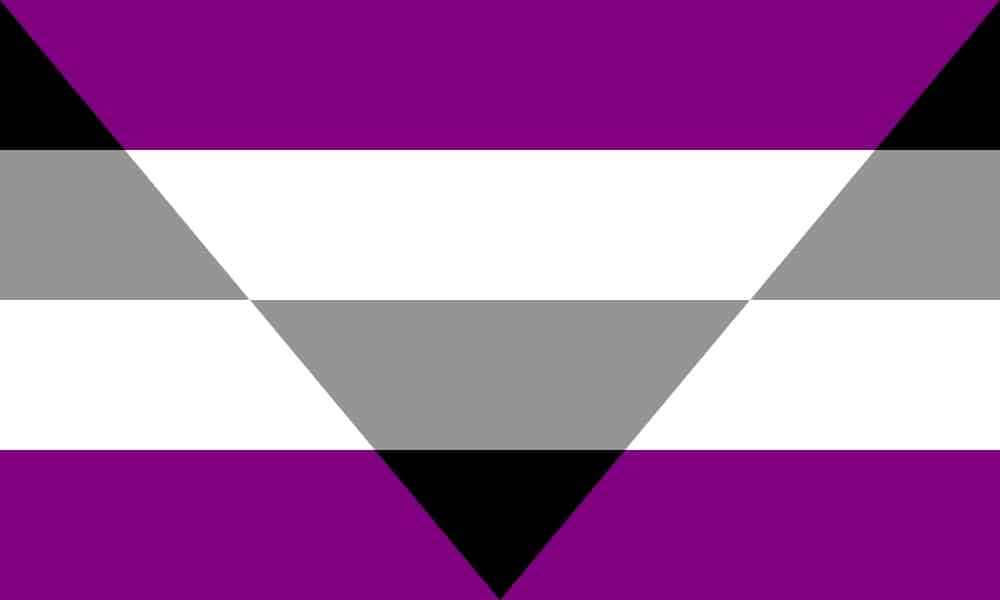What is aegosexual? Meaning, history, and usage.
The asexual (or, simply, “ace”) community encompasses a broad spectrum of identities that feel little to no sexual attraction. Some people feel no sexual attraction or desire to have sex with others – these are called asexuals. Other people might feel sexual attraction, but only in certain circumstances or to certain people. An example of one such ace identity is aegosexual.
What is aegosexual? Who are aegosexuals attracted to, and what does this term mean? Keep reading to learn more about this identity!
Related | Meet TV’s First Asexual Superhero On Legends of Tomorrow
Aegosexual Meaning
Aegosexual is an identity that falls on the asexual spectrum. Aegosexuals feel sexual arousal, but they also feel a disconnection from the subject of that sexual arousal. For example, they might watch pornography and experience arousal, but they don’t have a desire to participate in that sexual activity themselves. They have little to no actual desire to have sex with someone else.
Some people have simplified this explanation by saying aegosexuals are people who like the idea of sex but don’t actually want to have sex. Aegosexuals might enjoy and get aroused by sexual content in movies, photos, and books. They may even masturbate to sexual content but are more like disembodied watchers as opposed to active participants in sexual activity.
If you’re repulsed by the idea of having sex but like the idea of sex, you may be aego.
Where Did The Term “Aegosexual” Come From?
You can decipher the origin of “aegosexual” by breaking down the Latin words that form it: “a”, which means “without”, and “ego”, which translates to “the self”. The term “aegosexuality” simply translates to “sexuality without the self”.
Before the word “aegosexual” became popular, Dr. Anthony Bogaert defined the identity in 2012 as “autochorissexuality”. Autochorissexuality translates to “sexuality without identity”, taken from the Greek phrase “autochoris”.
However, this classification was controversial because it classified this identity as a paraphilia or psychological disorder – a belittling act that implies being aegosexual is harmful to the self and others. Other members of the ace community also pointed out that Dr. Bogaert himself was not asexual, which may have led to this incorrect and hurtful classification.
Tumblr user Sugar-and-Spite, who identified as autochorissexual, suggested that the term for this classification instead be changed so it can be reclaimed as an identity to embrace and celebrate. This user came up with the term “aegosexual” in November 2014, and it has since been embraced by the ace community.
Some people still use the term “autochorissexual” so they can reclaim it from its negative origin. Many use autochorissexual and aegosexual interchangeably. However, be mindful of using “autochorissexual” as it may come off as acephobic.
View this post on Instagram
How Do You Know If You’re Aegosexual?
Ever felt more like a third-person observer of sex or confused about feeling repulsed by the idea of sex? If you relate to any of these things, you may identify as aegosexual:
- You enjoy sexual content but dislike the idea of having sex.
- You visualize sexual acts between other people or in the third person but never with yourself as a participant.
- You have fantasies where fictional characters have sex without you.
- You consider yourself asexual but enjoy sexual content and masturbate to it.
This is by no means an exclusive list of what aegosexuals feel regarding their sexuality and attraction. If you want to learn more about this identity, check out forums and other online resources.
What Is Aegosexual-Flux?
Some members of the ace community identify as “aegosexual-flux”. While no one knows the origins of this term, many use it to refer to aegosexuals who are sometimes aegosexual but are otherwise asexual. Other aegosexuals use “aegosexual-flux” to refer to aegosexuals who are sometimes aego but are otherwise allosexual, those who experience sexual attraction to other people.
One argument for this term is that people who are sometimes aego but otherwise asexual may already fall under the identity “ace-flux”. Ace-flux is a gender identity used by those whose sexual attraction changes over time, but they generally stay asexual. Ace-flux may feel attracted to other people on some days but completely unattracted on others.
View this post on Instagram
What Is The Aegosexual Flag?
The aegosexual flag has several versions. The most commonly used aego flag has an inverted triangle with the colors of the asexual flag on it: black, gray, white, and purple.
- Black represents asexuality.
- Gray represents the in-betweenness of sexuality or the grey asexual and demisexual communities.
- White stands for non-asexuality. Some have also taken it to represent asexual partners and allies.
- Purple stands for the community.
A second version of the aegosexual flag doesn’t have the inverted triangle. A third has no triangle and uses different colors, as well: purple, gray, teal, and black.
- Purple represents the community.
- Gray stands for the spectrum that contains asexual microidentities.
- Teal represents the disconnection between sexual attraction and one’s self.
- Black represents asexuality.
What Pronouns Do Aegosexuals Use?
Aegosexuals may identify as non-binary, transgender, or cisgender, so they may choose a variety of gendered or non-gendered pronouns to refer to themselves.
He/him and she/her are examples of gendered pronouns, while they/them are gender-neutral. There are other new, gender-neutral pronouns adopted by the LGBT community, such as ze/zir and xe/xem.
Ask a person what their chosen pronouns are and make it a point to share yours. Be careful not to assume someone’s chosen pronouns based on gender or sexual identity!
The Bottom Line
Aegosexual is a micro-label on the asexual spectrum. If you’ve experienced feelings of sexual arousal when you see sexual content but don’t want to have sexual experiences, you might identify as aegosexual. Your experiences and orientation are valid, so feel free to explore your identity and learn more about your sexuality.
Related | What Asexuality Can Teach Us About Sexual Relationships







